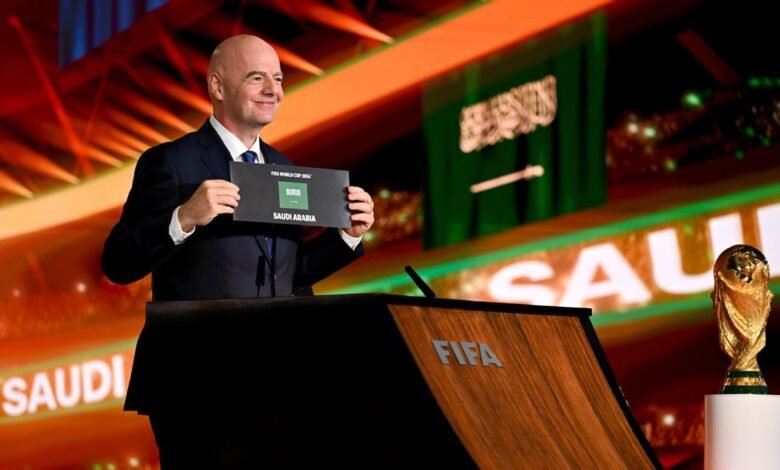
كأس العالم 2034: لماذا تستضيف السعودية هذا الحدث التاريخي؟ اكتشف الأسباب!
and cultural factors” when determining the timing of the tournament. This suggests that FIFA may lean towards a winter schedule for the 2034 World Cup, similar to how the 2022 Qatar World Cup was held in November and December to avoid extreme summer heat.
The decision to host the tournament in Saudi Arabia has sparked significant debate regarding human rights issues, particularly concerning women’s rights and LGBTQIA+ rights within the country. Critics argue that hosting such a high-profile event could serve as a form of “sportswashing,” where Saudi Arabia seeks to improve its international image while diverting attention from its controversial human rights record.
FIFA’s spokesperson emphasized that they are committed to thorough bidding processes for future tournaments, but skepticism remains about whether this commitment will translate into meaningful change on the ground. The organization faces pressure from various human rights groups urging them not to overlook these critical issues as they move forward with their plans.
As preparations begin for what is expected to be one of football’s most significant events, stakeholders will be closely watching how Saudi Arabia addresses these concerns and whether it can leverage this opportunity for genuine reform or merely use it as a platform for reputation management.we’re doing this to create a lasting legacy,” said a Saudi official regarding the ambitious plans for the 2034 World Cup. The country aims to showcase its transformation and commitment to modernity through this global event, but skepticism remains about whether it can deliver on such grand promises.
The concerns surrounding human rights, particularly in relation to labor practices and treatment of migrant workers, echo those raised during Qatar’s hosting of the 2022 World Cup. While FIFA has stated that it is implementing thorough bidding processes for future tournaments, critics argue that these measures must translate into tangible improvements on the ground.
As Saudi Arabia prepares its bid, questions linger about whether hosting such a prestigious event will genuinely lead to positive change or merely serve as a platform for sportswashing—using sport as a means to distract from ongoing human rights issues. The country’s Vision 2030 initiative aims at diversifying its economy and improving social conditions; however, many observers remain cautious about how effectively these goals will be achieved in practice.
In terms of logistics and planning for the tournament itself, considerations around climate are paramount. With extreme summer temperatures posing significant challenges, there is speculation that the tournament may need to be scheduled outside traditional months—potentially in early 2034 or October—to accommodate both weather conditions and religious observances like Ramadan.
Ultimately, while Saudi Arabia’s ambitions are high with promises of innovative stadiums and infrastructure development as part of their World Cup bid, only time will tell if they can meet these expectations while addressing critical human rights concerns that have historically overshadowed similar events in other nations.the future success of the national team will depend on how well these foreign players integrate and elevate the local talent. The presence of high-profile athletes like Cristiano Ronaldo and Karim Benzema not only boosts the league’s visibility but also provides invaluable experience for younger Saudi players who can learn from their skills and professionalism.
As Saudi Arabia prepares to host the 2034 World Cup, there is a dual focus on enhancing its domestic football infrastructure while simultaneously aiming for international recognition. The investment in stadiums, training facilities, and youth development programs is crucial for building a competitive national team that can perform well on the world stage.
The influx of foreign talent into the Saudi Pro League has sparked debates about its long-term impact. While it may provide immediate benefits in terms of performance and viewership, there are concerns that it could hinder the development of homegrown players if they find themselves sidelined by more established stars. Balancing this dynamic will be essential as Saudi Arabia looks to solidify its status as a footballing nation both regionally and globally.
hosting the 2034 World Cup presents an opportunity for Saudi Arabia to showcase its progress in sports while addressing ongoing human rights concerns. As preparations continue, all eyes will be on how effectively they can leverage this event to foster genuine growth within their football community while navigating complex geopolitical narratives surrounding sportswashing and reputation management.Saudi Arabia’s bid to host the 2034 FIFA World Cup has sparked significant debate regarding human rights issues and the concept of “sportswashing.” Critics argue that hosting such a high-profile event in a country with a controversial human rights record raises serious ethical concerns. Human rights organizations, including Amnesty International and Human Rights Watch, have expressed alarm over Saudi Arabia’s treatment of migrant workers, restrictions on freedom of expression, and criminalization of LGBTQ+ individuals.
FIFA has been criticized for its bidding process, which some believe fails to adequately address these human rights risks. Minky Worden from Human Rights Watch emphasized that FIFA’s policies should not merely be symbolic but must lead to tangible improvements in host countries’ human rights practices.
The term “sportswashing” refers to the use of sports events to improve a country’s image tarnished by allegations of wrongdoing. Saudi Arabia is seen as engaging in this practice as it seeks to enhance its global reputation through major sporting events while simultaneously facing scrutiny over its domestic policies.
Despite these criticisms, Saudi officials maintain that their involvement in international sports is part of a broader strategy—Vision 2030—to diversify the economy away from oil dependency. Mohammed bin Salman has openly stated his indifference towards accusations of sportswashing if it contributes positively to economic growth.
As preparations for the tournament continue, questions remain about whether hosting the World Cup will lead to meaningful change within Saudi Arabia or simply serve as an opportunity for image enhancement amidst ongoing human rights violations.The article discusses various aspects of the Saudi Pro League and its implications, particularly in light of the upcoming 2034 World Cup that Saudi Arabia is set to host. Here are some key points:
- Attendance Trends: The average attendance for Al Nassr games increased slightly during Cristiano Ronaldo’s first full season with the team, but many teams in the league struggled with low attendance figures.
- Player Perspectives: Players have mixed feelings about their experiences in Saudi Arabia. While some, like Neymar and Karim Benzema, express positive sentiments about fan support and personal happiness, others like Aymeric Laporte highlight challenges such as traffic issues affecting quality of life.
- Human Rights Concerns: There are significant concerns from human rights organizations regarding Saudi Arabia’s record on human rights as it prepares to host the World Cup. Critics argue that FIFA has not adequately addressed these issues in its bidding process.
- Sportswashing Accusations: The term “sportswashing” is used to describe how countries may use sports events to improve their international image despite ongoing human rights abuses. Mohammed bin Salman has openly stated his indifference towards accusations of sportswashing if it contributes positively to economic growth.
- Future Stars: Looking ahead to potential stars for the 2034 World Cup, several young players currently under 30 are highlighted as likely candidates who could shine at that tournament.
while there is excitement surrounding football development in Saudi Arabia and its hosting of major events like the World Cup, underlying issues related to human rights and player experiences remain contentious topics within this narrative.






تعليق واحد